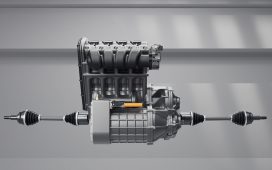Jeep maker Stellantis has threatened to shift a planned battery plant from Canada to the US unless it receives billions more in state subsidies offered to a rival, in the latest manoeuvre by a big manufacturer in the international battle over green incentives.
It comes as the world’s fourth biggest carmaker, which also produces Vauxhall/Opel, Fiat, Citroën, Peugeot, DS, Alfa Romeo, Maserati and Abarth vehicles, leads a campaign in Europe for the UK and EU to renegotiate tariff rules in the Brexit deal.
Stellantis and the South Korean electronics maker LG announced plans in March last year to build a C$5bn (£3bn) electric-vehicle “gigafactory” in the city of Windsor, Ontario, an investment that received nearly C$1bn in subsidies from the federal and provincial governments.
The factory opening date was set for 2024, with the deal touted by the governing Liberal party as a key win in luring multinational automakers to the country.
Months later, the US passed the Inflation Reduction Act, promising generous subsidies for battery production. In April this year, Ottawa matched incentives offered under the IRA in order to secure a deal with Volkswagen for a sprawling battery plant in St Thomas, Ontario, with subsidies that could cost as much as C$13bn over the next decade.
Now, Stellantis has demanded similar benefits from Canada, warning that otherwise it will move production to the US.
Canada’s prime minister, Justin Trudeau, and industry minister, François-Philippe Champagne, were in the South Korea capital on Wednesday in an attempt to salvage the plans. Champagne has called on Ontario to add more money to pay its “fair share” in order to rescue the deal.
“Trust me, it’s very difficult to attract these investments,” he told reporters from Seoul, before a planned impromptu meeting with LG bosses. “We fought very hard for them to invest in Canada and we certainly want them to continue making investments, and now is the time for our friends in Ontario to pay their fair share.”
However, Ontario, which granted C$500m in subsidies to Stellantis and Volkswagen, is arguing that the onus is on the federal government to kick in more money to save the project. “It’s disappointing it’s come to this right now,” said the province’s premier, Doug Ford. “But we believe in working with the federal government. We can’t afford to lose Stellantis.”
Brian Kingston, the head of the Canadian Vehicle Manufacturers’ Association, said the standoff was a “very serious situation” but senior government officials recognised the importance of securing the Stellantis investment.
“If we don’t compete with the Americans on these strong subsidies, it will be very difficult to make the case to put these types of facilities in Canada,” he said, as the race for the electrification of the industry accelerates. “I’m hopeful that an agreement will be reached because this is hugely important for the Canadian economy.”
The country’s largest auto workers union called the standoff “outrageous” over fears that thousands of jobs could be lost if the two sides fail to reach an agreement.
“Once those decisions get to a certain point down the road they are very hard to reverse and we cannot afford to let these jobs slip through our fingers,” the national president of Unifor, Lana Payne, said.
It comes after Stellantis called for an overhaul of the Brexit deal struck between the UK and EU, saying a change in rules on where vehicle components are sourced from threatened the viability of its plants in Britain.
It called for an expected rise in the proportion of parts by value coming from the UK – due to increase next year from 40% to 45% – should be delayed to 2027 to give it more time to source batteries from within Europe.
That call was echoed on Wednesday by Ford, Jaguar Land Rover and the European Automobile Manufacturers’ Association, while on Thursday the VDA, the German car industry lobby group, joined them in calling for the deadline to be extended.








